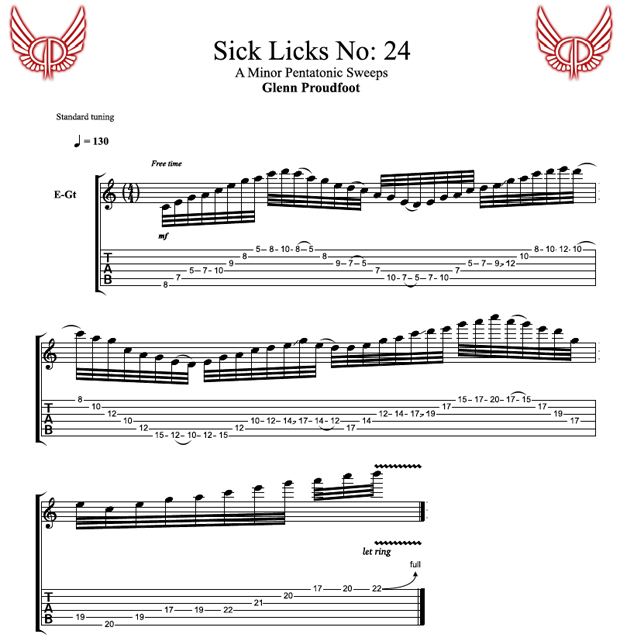Sick Licks: The Outer Limits of the Pentatonic

In this Sick Lick, I'm using the A minor (straight) pentatonic scale: A, C, D, E, G.
As I was learning and discovering the guitar, the pentatonic scale was the tonality I could most relate to. It's no great secret that most blues and rock solos are based around this scale, but I really had to discover this for myself through years of hard work and practice. It's easy to be told or read what to do, but it's practice alone that will give you the ultimate understanding.
It was through this hard work and dedication that I started to develop my own approach to the scale. Once I had an understanding of the tonality, I set about adapting every technique I could to the scale: sweeping, arpeggios, legato, etc.
Traditionally, the pentatonic scale is taught by playing the scale through in each position with two notes per string. My approach was a little different. I focused on what notes where within the scale and mapped out all these notes on the guitar and started to build sweeping runs and arpeggios.
This is how I basically developed my style. I was never concerned with traditional teachings; I focused on developing what I felt and visualized. In no way am I telling you to throw away your books and ignore your teacher — not in the slightest. But what I am saying is that you should experiment and go with what you feel, since each of us has a special way of expressing ourselves on the guitar. This is the thing we should harness and develop the most. We shouldn't be obsessed with how other people do it. Yes, we should learn and gain inspiration from them, but it is our own expression or voice that needs to be discovered. This is the key!
The Lick
This lick utilizes the use of three-, four-, five- and six-string arpeggios, while combining picked lines and also legato. There's a lot to take in here, but if you break it down and go section by section, it can make it a lot easier to get a grasp of. If you know the pentatonic scale, there is no note here that you haven't already played or used in your soloing, so there's nothing to be intimidated by.
Get The Pick Newsletter
All the latest guitar news, interviews, lessons, reviews, deals and more, direct to your inbox!
All I'm doing is expanding the patterns and combining wide stretches and arpeggios to be able to create free-flowing runs all over the neck. Speed is a major factor in my example, but it's not essential. You can play this at any speed. You can use these arpeggio runs as nice slow passages into bends, or you can apply them to a more jazz-blues sound. Anything, really!
Use this example to open up and expand whatever ideas you already have formed with the pentatonic scale.
I hope you enjoy! Please join me on YouTube here.

Australia's Glenn Proudfoot has played and toured with major signed bands and artists in Europe and Australia, including progressive rockers Prazsky Vyber. Glenn released his first instrumental solo album, Lick Em, in 2010. It is available on iTunes and at glennproudfoot.com. Glenn was featured in the October 2010 issue of Guitar World and now creates "Betcha Can’t Play This" segments and lessons for GW. Glenn also has a monthly GW column, "Loud & Proud," which offers insight into his style and approach to the guitar. Glenn is working on a project with Ezekiel Ox (ex Mammal) and Lucius Borich (Cog), which is managed by Ted Gardner, ex-Tool and Jane's Addiction manager. The band has done pre-production on 22 tracks and is set to hit the studio and finish their first studio album. The album is set for release in 2012. Glenn also is working on the followup to his debut album; it, too, will be released in 2012.










